We’re sorry, this site is currently experiencing technical difficulties. Please try again in a few moments. Exception: request blocked

Embassy of the
Socialist republic of vietnam, in the united states of america.
- Ambassador Pham Quang Vinh (2014 - 2018)
- Ambassador Nguyen Quoc Cuong (2011-2014)
- Ambassador Le Cong Phung (2008 - 2011)
- Ambassador Nguyen Tam Chien (2001 - 2007)
- Ambassador Le Van Bang (1995 - 2001)
- Offices/Sections
- Foreign Policy
- Viet Nam's visa procedures
- Visa Exemption
- PASSPORT ISSUANCE, RENEWAL, OR ANNOTATION
- Legalization of documents for marriage
- power of attorney
- Birth registration
- Certificate of Vietnamese origin
- Citizen registration
- Renouncement of Vietnamese citizenship
- Legalization
- permit to transport remains and dead bodies to Vietnam
- Instructions For Registration to Retain Vietnamese Citizenship
- Embassy Activities
- Joint Statements
Search form
Tue, 10 Sep 2024 19:14:17 -0400
You are here
I. to apply for a visa to come to vietnam, you have the following options:.
For you best convenience in applying tourist visa to Viet Nam, you can leave the required information on our visa application assistant portal: https://vnmvisa-assistant.web.app
1. APPLY AT THE EMBASSY (STANDARD VISA)
a) Apply in-person at the Embassy ;
b) Apply by mail to the Embassy .
Address and contacts: see Part IV below
2. APPLY THROUGH THE IMMIGRATION DEPARTMENT (EVISA)
Access the link administered by the Immigration Department, Ministry of Public Security of Viet Nam (evisa.xuatnhapcanh.gov.vn)
Note: If have any difficulties or problems occur while applying for the e-visa, please contact the Immigration Department, Ministry of Public Security via email: [email protected] or hotline: +84.24.382.640.26
II. Processing time (at the Embassy of Viet Nam)
1. If applicant hasn't had the letter of approval: Five (05) working days after submission of complete application with all required documentation and fee
* Expedited service: 1 (one) to 4 (four) working days upon your request (to be issued at the Embassy). In case applying by mail, kindly attach an Expedited service or URGENT note/label on your envelope or in your application package.
2. If applicant already had the letter of approval: Three (03) business days after submission of complete application with all required documentation and fee.
* Expedited service: 24-hour processing time (additional fee is required). Kindly attach an Expedited service or URGENT note/label on your envelope or in your application package.
*Note: You can request your hosting/ inviting organization or individual to carry out the procedures to request the competent authority of Vietnam to grant the approval
III. Other important notices
* Make sure you check all personal information printed on your visa. In case you find any inaccuracy, please contact the Embassy immediately for correction.
* Visa’s length and number of entries: your visa can be issued with the length and the number of entries not exceeding that indicated in the visa approval by the competent authority of Vietnam. US citizens can be granted multiple visas with the length up to 01 year.
* Duration of stay: the length of your visa validity is indicated on the visa. You can only enter Viet Nam from the date of entry printed on the visa and must leave by the end of the expiration date.
* The Embassy reserves the right to request further information and documentation from applicants and reject any visa application without explanation
IV. For more information (only for visa applicant at the Embassy) , please contact the Consular Division of the Embassy:
* Business hours: 9:00 A.M – 12:00 P.M and 02:00 P.M – 04:30 P.M from Monday through Friday, except on Viet Nam and United States holidays .
- Address: 1233 20th Street NW, Suite 400, Washington D.C., 20036.
- Telephone: (202) 999 6589 (text message/call); (202) 716 8666 (text message/call); (202) 999 6938 (text message/call).
- Fax: 202-861-0917; Email: [email protected]

- The Embassy
- Consular Services
- Vietnam - US Relations
Add: 1233 20th St NW, Ste 400, Washington, DC 20036
Tel: 202-861-0737
202-716-8666 (consular procedures)
202-999-6589 (regular visa)
Fax: 202-861-0917
[email protected] (consular affairs)
[email protected] (general information)
Hours of Operation (EST)
Embassy: Mon - Fri, 10:00 am to 12:00 pm & 2:00 pm to 5:00 pm
Consulate: Mon - Fri, 09:00 am to 12:00 pm & 2:00 pm to 4:30 pm
Featured Links
- Travel Advisories |
- Contact Us |
- MyTravelGov |
Find U.S. Embassies & Consulates
Travel.state.gov, congressional liaison, special issuance agency, u.s. passports, international travel, intercountry adoption, international parental child abduction, records and authentications, popular links, travel advisories, mytravelgov, stay connected, legal resources, legal information, info for u.s. law enforcement, replace or certify documents.
Before You Go
Learn About Your Destination
While Abroad
Emergencies
Share this page:
Travel Advisory July 24, 2023
Vietnam - level 1: exercise normal precautions.
Reissued with obsolete COVID-19 page links removed. Exercise normal precautions in Vietnam.
Read the country information page for additional information on travel to Vietnam.
If you decide to travel to Vietnam:
- Enroll in the Smart Traveler Enrollment Program (STEP) to receive Alerts and make it easier to locate you in an emergency.
- Follow the Department of State on Facebook and Twitter .
- Review the Country Security Report for Vietnam.
- Visit the CDC page for the latest Travel Health Information related to your travel.
- Prepare a contingency plan for emergency situations. Review the Traveler’s Checklist .
Embassy Messages
View Alerts and Messages Archive
Quick Facts
Must have six months’ validity remaining.
One visa page required for entry stamp.
Not required.
None. However, Vietnamese Dong in excess of VND 15,000,000 or foreign currency in excess of 5,000 U.S. dollars or equivalent must be declared.
Embassies and Consulates
U.S. Embassy Hanoi - Consular Annex 170 Ngoc Khanh Ba Dinh District Hanoi, Vietnam Telephone: From outside Vietnam: +84-24-3850-5000 From the U.S.: 011-84-24-3850-5000 From landline within Hanoi: 3850-5000 From mobile or landline within Vietnam: 024-3850-5000
Emergency: From outside Vietnam: +84-24-3850-5000 or +84-24-3850-5105 From the U.S.: 011-84-24-3850-5000 From landline within Hanoi: 3850-5000 or 3850-5105 From mobile or landline within Vietnam: 024-3850-5000 or 024-3850-5105 Fax: (+84-24) 3850-5010 Email: [email protected] Facebook
U.S. Consulate General Ho Chi Minh City 4 Le Duan, District 1 Ho Chi Minh City, Vietnam Telephone: From outside Vietnam: +84-28-3520-4200 From the U.S.: 011-84-28-3520-4200 From landline within Ho Chi Minh City: 3520-4200 From mobile or landline within Vietnam: 028-3520-4200
Emergency: From outside Vietnam: +84-28-3520-4200 From the U.S.: 011-84-28-3520-4200 From landline within Ho Chi Minh City: 3520-4200 From mobile or landline within Vietnam: 028-3520-4200 Fax: (+84-8) 3520-4244 Email: Contact Us Here
EMERGENCY TELEPHONE NUMBERS WITHIN VIETNAM
Police: 113 Fire brigade: 114 Ambulance: 115
Destination Description
Learn about the U.S. relationship to countries around the world.
Entry, Exit and Visa Requirements
Entry Requirements: You must have a valid passport and a visa (or pre-approval for a visa on arrival) to enter Vietnam. Your passport must be valid for six months beyond your planned stay, and you must have at least one blank visa page (not including the endorsement page). Visit Mission Vietnam’s website for the most current information. If you arrive in Vietnam without an appropriate visa (which could be an e-visa) or pre-approval for a visa on arrival, you will be denied entry . The U.S. Mission to Vietnam cannot assist U.S. citizens who arrive in Vietnam without required visas. U.S.-Vietnam dual nationals should consult the Department of State’s information page for Travelers with Dual Nationality and the Embassy of Vietnam for travel requirements. You must enter and exit Vietnam on the same passport. If using a Vietnamese passport to enter and exit the country, your passport must have at least six months’ validity from your return date to the United States.
Visas: The Government of Vietnam requires a “visa sponsor” for all visa categories, except for E-visa. A visa sponsor is a local business or travel agent to apply for a pre-approval letter with a Vietnamese Immigration Office in Vietnam on behalf of the traveler. Only on receipt of the pre-approval letter can a foreigner apply for an appropriate visa at a Vietnamese Embassy or Consulate abroad, or for a visa on arrival. For more information about this process, please visit the website of the Vietnamese Embassy here . When you apply for a visa to enter Vietnam, be sure to request the visa category that corresponds to your purpose of travel. Please refer to Vietnam’s Ministry of Foreign Affairs website for information detailing visa categories. If you plan to work in Vietnam, you must obtain a work permit before applying for your visa. If you change the purpose of your visit after you have received your visa, you must obtain a new visa outside of Vietnam appropriate for your new activities before beginning those activities. Under local immigration law, employment-based visas are based on a petition from a specific employer, and workers may be unable to switch jobs without securing a new visa. In addition, employers may prevent the departure of contracted employees from Vietnam if they violate contract terms. Before accepting employment in Vietnam, make sure you understand the conditions of contracts and employment-based visas.
Note that travelers with a U.S. APEC Business Travel Card will still need a valid visa to enter Vietnam. The United States is a transitional member of APEC and does not reciprocate with other economies regarding full pre-clearance benefits to applicants. As such, no countries are listed on the back of U.S. APEC Business Travel Cards and card holders are required to present any travel or identity documentation, such as a passport and visa (where applicable), required by Vietnam. If a U.S. APEC Business Travel Card holder does not conform to Vietnam’s entry requirements, the card holder may be refused entry.
Please consult Mission Vietnam’s website for more information.
Please note that Vietnam requires a valid visa, residence card, or approval from the Immigration Department to leave the country. Immigration officials will apply a fee to replace lost/stolen visas or will assess a fine for any visa overstays. The Government of Vietnam has recently increased the penalties for visa overstays, and fines can be substantial. In addition, the processing of exit visas for cases involving visa overstays can take one to two weeks, and longer for more complex cases.
If your U.S. passport is lost or stolen in Vietnam, you will need both a replacement passport and a replacement Vietnamese visa to legally remain in or depart Vietnam. The U.S. Embassy in Hanoi and the Consulate General in Ho Chi Minh City can usually issue you a limited validity replacement passport in as little as one business day for emergency purposes; however, the Vietnamese government requires three to five working days to issue a replacement visa. For lost and stolen passports, immigration officials will also request a police report. You must file a report of a lost or stolen passport with the police in the location where the loss or theft of your passport occurred, or authorities may refuse to accept the report. The U.S. Embassy and the Consulate General cannot expedite the replacement of your Vietnamese visa.
If you plan to travel from Vietnam to Laos by land, you should request that an adhesive visa be affixed to your passport instead of a detachable one. Lao immigration officials require proof that travelers have departed Vietnam, something that can only be shown with an adhesive visa. Vietnamese officials remove detachable visas from passports when travelers depart Vietnam, leaving travelers with no proof of their Vietnam departure. This situation can result in Lao officials requiring travelers to return to Vietnam.
Pre-approval for Visa on Arrival: The Government of Vietnam has authorized some businesses and travel agencies to arrange for pre-approval for a “visa on arrival” at the airport. On a receipt of a pre-approval letter, travelers may then travel to Vietnam and apply for a visa upon landing to Vietnam. Please be advised that you should not travel to Vietnam without having been issued a pre-approval letter as it may result in a denial of entry by immigration authorities. To avoid having to rearrange your travel date, please do not make travel arrangement before you receive your pre-approval letter.
E-visa: U.S. citizens can apply online for an E-visa on the Vietnam Immigration website . The E-visa is valid for a maximum of 90 days, single or multiple entry, and does not allow for renewal or extension from within the country. The E-visa is valid for a maximum of 90 days, single or multiple entry, and does not allow for renewal or extension from within the country. An E-visa is usually processed within three to five working days after the Vietnam Immigration Department receives the completed application and E-visa fee. E-visa holders must present the printed E-visa and valid passport at the port of entry. Prior to your travel with an E-visa to Vietnam, we recommend travelers to carefully check their E-visa to make sure all information is correct, and that you will enter/exit Vietnam through a port of entry that you had selected at the time of application. An error on E-visa, including minor differences between the information on the application and the biographical information on the passport, may result in a denial of entry by immigration authorities. The U.S. Embassy and Consulate General are unable to change the information on your E-visa or help expedite the process as Vietnamese E-visa is under the sole jurisdiction of the Vietnamese government.
Certificate of Visa Exemption: Vietnamese nationals residing abroad indefinitely, their spouses, and their children may apply for a Certificate of Visa Exemption. The certificate has a maximum validity of five years, during which time the holder can enter Vietnam and stay for up to six months without applying for a visa. More information can be found on the Vietnam Embassy website .
The U.S. Department of State is unaware of any HIV/AIDS entry restrictions for visitors to or foreign residents of Vietnam.
Immunization information for travelers can be found on the Centers for Disease and Control’s website .
Information about dual nationality or the prevention of international child abduction can be found on our website. For further information about customs regulations, please read our Customs Information page .
Safety and Security
The Department of State recommends that U.S. citizens overseas always maintain a high level of vigilance and take appropriate steps to increase their security awareness while traveling internationally. Please visit www.travel.state.gov for up-to-date information.
Messages regarding weather-related events are posted here and on the Embassy/Consulate General website .
While in Vietnam you are subject to Vietnamese laws. U.S. citizenship will not help you avoid arrest or prosecution. If you violate local laws, even unknowingly, you may be arrested, expelled, or imprisoned. Individuals establishing a business or practicing a profession that requires additional permits or licensing should seek information from the competent local authorities, prior to practicing or operating a business.
Vietnamese authorities routinely do not provide timely notification of the arrest of a U.S. citizen to the U.S. Embassy or Consulate General or approval for consular officials to visit U.S. citizens. The delays for both – particularly for access – can take several weeks. Note that if you enter Vietnam with a non-U.S. passport, the Government of Vietnam has different notification and access responsibilities for the U.S. Embassy or Consulate General. See our webpage for further information.
Small-scale, peaceful protests occasionally occur in Vietnam’s major cities, but large-scale demonstrations are rare. As in any country, you should avoid large protests, as they can become violent with little or no warning.
The Government of Vietnam may not allow or authorize travel to certain areas of the country that are deemed sensitive. Check with local authorities before visiting border areas to see if you need to obtain a travel permit issued by local authorities. U.S. citizens have been detained after traveling in areas close to the Vietnamese borders with the People’s Republic of China, Cambodia, and Laos. These areas are not always marked, and there are no warnings about prohibited travel.
Safety standards in Vietnam are not at the same level as those in the United States and vary greatly from company to company and province to province. This is especially true for fire safety codes. Travelers should be aware that many buildings, including hotels, shops, and restaurants, have limited or no fire safety equipment or emergency exits. Ground and water transportation also lack safety regulations.
Travelers to Vietnam should have no expectation of privacy and should safeguard all personal documents and electronic devices. Exercise caution when discussing sensitive or proprietary information.
Crime: Crime in Vietnam is rated high. Exercise vigilance and the same commonsense security precautions you would in any major metropolitan city in the United States.
Violent crime against foreigners is rare; however, petty crimes, such as theft, bag grabs, and pickpocketing occur regularly, especially in crowded areas and tourist locations. Typically, there is a rise in petty crime during the Christmas and Tet (Lunar New Year) holiday seasons, including during the day and in well-lit areas. Motorcyclists are known to snatch bags, cameras, cell phones, and other valuables from individuals riding or walking on the street. If you are targeted by thieves, do not resist, and report the incident immediately to local police and to the U.S. Embassy in Hanoi or the U.S. Consulate General in Ho Chi Minh City. Keep a tight hold on bags as you enter and exit vehicles and as you walk around. Hold tightly to cell phones when using them outside and lock and stow phones until you actually need to use them.
Some U.S. citizens have reported threats of death or physical injury connected to business-related disputes. You should report such threats to local authorities and if you feel unsafe, you should depart the country.
Keep your passport and other important valuables in your hotel in a safe or another secured location at all times and carry both photo and digital copies of your passport. You should immediately report the loss or theft of your U.S. passport to the local police and the U.S. Embassy or the U.S. Consulate General. See section on “Visas” for information on what to do if your passport/visa are lost or stolen.
Sexual Assault: Women travelling alone may be subject to some forms of harassment and verbal abuse. Sexual assault, harassment and rape do occur. To minimize the risk avoid travelling alone, especially at night; remain particularly vigilant in less populous areas; and be careful when dealing with strangers or recent acquaintances. Local authorities may not always respond adequately to reports of sexual violence and harassment. If you are the victim of a sexual assault, you should report it immediately to local authorities and to the U.S. Embassy or Consulate General. Never leave food or drinks unattended or in the care of strangers. Be wary of accepting snacks, beverages, gum, or cigarettes from new acquaintances. These items may contain drugs that could put you at risk of sexual assault and robbery.
Male violence against women and sexual harassment is often ignored by the police. In areas foreigners frequent, women have reported harassment and assault such as men exposing themselves, asking for sexual favors, and groping.
Drugs: Recreational drugs available in Vietnam can be extremely dangerous and can result in death. Drugs sold in Vietnam may be fake, synthetic, or laced with toxic ingredients undetectable to the buyer. This includes nitrous oxide balloons widely available in nightlife establishments. You should also avoid purchasing liquor or cigarettes from street vendors or strangers, as the authenticity of the contents cannot be assured.
Victims of Crime: U.S. citizen victims of sexual assault are encouraged to contact the U.S. Embassy or Consulate General for assistance. Vietnam’s local equivalent of an emergency line is 113. Local police will issue a report of a crime, but generally will only initiate investigations for crimes they determine serious, which do not always equate with U.S. standards. Investigations can take several months or even years to complete.
In the event you are a victim of a crime, local police will issue a crime report in Vietnamese, but generally will only initiate investigations for crimes they determine serious. While the overall situation is improving, some police have asked for bribes, ostensibly to support local police efforts or to facilitate investigation of a crime. If you are involved in a situation where a police officer is soliciting money, contact American Citizen Services at the U.S. Embassy or Consulate General.
See our webpage on help for U.S. victims of crime overseas .
We can:
- Help you find appropriate medical care.
- Assist you in reporting a crime to the police.
- Contact relatives or friends with your written consent.
- Provide general information regarding the victim’s role during the local investigation and following its conclusion.
- Provide a list of local attorneys.
- Provide information on victim’s compensation programs in the United States.
- Provide an emergency loan for repatriation to the United States and/or limited support in cases of destitution.
- Help you find accommodation and arrange flights home.
- Replace a stolen or lost passport.
Domestic Violence: U.S. citizen victims of domestic violence are encouraged to contact the Embassy or Consulate General for assistance . Note that local authorities take a different attitude towards domestic violence cases and are hesitant to get involved in cases involving foreigners. Vietnam has very limited infrastructure to support victims of domestic violence.
Tourism: The tourism industry is unevenly regulated, and safety inspections for equipment and facilities do not commonly occur. Hazardous areas/activities are not always identified with appropriate signage, and staff may not be trained or certified either by the host government or by recognized authorities in the field. In the event of an injury, appropriate medical treatment is typically available only in/near major cities. First responders are generally unable to access areas outside of major cities to provide urgent medical treatment. U.S. citizens are encouraged to purchase medical evacuation insurance. See our webpage for more information on insurance providers for overseas coverage .
Local Laws & Special Circumstances
Criminal Penalties: You are subject to Vietnamese laws. If you violate local laws, even unknowingly, you may be expelled, arrested, or imprisoned. Individuals establishing a business or practicing a profession that requires additional permits or licensing should seek information from the competent local authorities, prior to practicing or operating a business. Penalties for possessing, using, or trafficking in illegal drugs in Vietnam are severe, and convicted offenders can expect long jail sentences and heavy fines, or even the death penalty. Police periodically raid nightlife establishments suspected of engaging in the drug trade and during these raids will subject all patrons present to drug testing at the police station. A positive result, regardless of whether drugs were consumed in Vietnam or before entry, may result in criminal charges.
In Vietnam, you may be taken in for questioning if you do not have proper ID, such as a passport or a copy of your visa. Driving under the influence of alcohol resulting in a fatal accident could lead to immediate imprisonment. If you break local laws in Vietnam, your U.S. passport will not help you avoid arrest or prosecution. Note that the Vietnamese legal system allows for lengthy criminal investigation periods that can lead to prolonged pre-trial detention; some investigations can last years without any explanation.
Furthermore, some laws are also prosecutable in the United States, regardless of local law. You can be prosecuted in the United States for engaging in sexual conduct with children or for using or disseminating child pornography in a foreign country regardless of the legality of these activities under the host country’s laws.
Arrest Notification in Vietnam: If you are arrested or detained, ask police or prison officials to notify the U.S. Embassy or Consulate General immediately. There are often delays in notification by the Vietnamese authorities to the U.S. Embassy or Consulate General and officials have been known to delay consular access to prisoners for several weeks.
Counterfeit and Pirated Goods: Although counterfeit and pirated goods are prevalent in many countries, they may still be illegal according to local laws. You may also pay fines or forfeit them upon return to the United States. See the U.S. Department of Justice website for more information.
Gambling: Gambling is highly regulated by the government and persons or businesses running games or gambling halls are required to be licensed. The Government of Vietnam pursues cases of running or playing in unlicensed games aggressively. There are currently U.S. citizens serving jail sentences of three to five years because of illegal gambling.
Dual Nationality: Dual nationality is accepted by the Vietnamese government in some, but not all, circumstances. However, dual nationals should be aware that Vietnam recognizes their Vietnamese citizenship as primary before others. In such cases, the U.S. Embassy and Consulate General may be limited in the consular services we are able to provide. U.S. citizens who also hold Vietnamese citizenship and are currently residing in Vietnam may wish to contact local authorities and/or seek competent legal advice on how local laws may affect their status. For detailed information on Vietnamese nationality law and other legal issues visit the Embassy of Vietnam website .
Work Authorization: The Government of Vietnam maintains strict laws with respect to foreign workers. U.S. citizens planning to work in Vietnam should make sure that they are in full compliance with Vietnamese regulations. Penalties can be severe and include deportation, fines, or detention. Vietnam immigration law allows for companies sponsoring foreign employees to exercise control over their employees’ visas, including prohibiting their exit from the country if they have any outstanding debts.
Teaching English: We advise those considering accepting an English teaching job in Vietnam to carefully review the terms of the contract regarding working and living conditions and to ask for multiple references from persons familiar with the institution, especially former U.S. citizen employees, before committing to contracts. Some U.S. citizens have reported their employers have reneged on contract terms, including offering significantly lower salaries than agreed or seizing their passports, and employers have caused complications with the exit visa process for employees who quit, complicating the exit visas required to depart the country.
Hotels: Hotels in Vietnam require you to present your passport (and visas, if issued separately) upon check-in so that your stay can be registered with local police. Every guest in a hotel room or private residence must be registered, regardless of nationality. If you stay at a private residence (i.e., at the residence of family or friends), you must comply with registration requirements by visiting the local police station and registering your stay within 24 hours. Some provinces allow registration online.
Exports: Vietnamese law prohibits the export of antiques. However, these laws are vague and unevenly enforced. Customs authorities may inspect and seize your antiques without compensating you, and the determination of what is an “antique” can be arbitrary. If you purchase non-antique items of value, you should retain receipts and confirmation from shop owners and/or the Ministry of Culture and the Customs Department to prevent seizure when you leave the country.
Imports: Vietnamese authorities have seized documents, audio and video tapes, compact discs, literature, and personal letters they deem to be pornographic or political in nature or intended for religious or political proselytizing. It is illegal to import weapons, ammunition, explosives, military equipment and tools (including uniforms), narcotics, drugs, toxic chemicals, pornographic and subversive materials, firecrackers, or children's toys that have "negative effects on personality development, social order, and security." For up-to-date information on Vietnam Customs information, please visit the Vietnam Customs website .
Freedom of Expression: The Government of Vietnam maintains strict control over all forms of political speech, particularly dissent or speech it deems as critical of the government and/or party. U.S. citizens have been detained, tried, and convicted for political activities (including criticizing the government or its domestic/foreign policies or advocating alternatives to Communist Party rule), possession of political material, and non-sanctioned religious activities (including proselytizing). Authorities have also detained U.S. citizens for posting messages on blogs or online chatrooms that are perceived to be political or critical of the government. U.S. citizens of Vietnamese descent should be especially careful with their online postings. Review the latest version of the Vietnam Human Rights Report for the latest information on Freedom of Expression in Vietnam.
Association with Groups: Persons whom the Government of Vietnam perceives to be associated with dissident or political groups may be denied entry to Vietnam, prevented from departing, detained, interrogated, placed under surveillance, or even tried and convicted. Note that if arrested, you could be subject to lengthy detention without access to an attorney or family members. U.S. citizens of Vietnamese descent should be especially careful about associating with dissident groups. U.S. citizen travelers have been summoned by immigration or local security officials for reasons that are unclear or not explicitly related to any suspected or alleged violation of law. We recommend that U.S. citizens finding themselves in this situation contact the U.S. Embassy or Consulate General immediately for further information and/or assistance.
Photography: Taking photographs of anything that could be perceived as being of military Taking photographs of anything that could be perceived as being of military or security interest may result in questioning by authorities, fines, or delayed travel. You should be cautious when traveling near military bases and avoid photography in these areas. Disputes: The Vietnamese government has occasionally seized the passports and blocked the departure of foreigners involved in commercial disputes. U.S. citizens whose passports have been seized by Vietnamese authorities should contact the Embassy or Consulate General for assistance .
Civil Procedures: Civil procedures in Vietnam, such as marriage, divorce, documenting the birth of a child, and issuance of death certificates, are highly bureaucratic and can be slow. Local authorities may refuse a request to include a non-Vietnamese name on a birth certificate. In addition, for those wishing to get married in Vietnam, you will need a notarized affidavit of single status. Please contact the Vietnamese Embassy in Washington, D.C. , or the Vietnamese Consulate General in San Francisco or Houston concerning documentary requirements for these services. Enforcement of civil orders is frequently difficult or non-existent.
Women Travelers: See our travel tips for Women Travelers .
LGBTQI+ Rights: There are no legal restrictions on same-sex sexual relations or in attending LGBTIQ+ events in Vietnam. See our LGBTQI+ Travel Information page and section 6 of our Human Rights report for further details.
Accessibility: Most public places and public transportation are not accessible to persons with disabilities. Sidewalks, curb ramps, restrooms, road crossings, and tourist areas are not equipped to assist such individuals. New, modern buildings and facilities in larger urban cities are regularly built with ramps and accessible entryways.
Students: See our Students Abroad page and FBI travel tips .
Medical facilities in Vietnam, including emergency response services, frequently do not meet international standards and may lack medicine and supplies. We strongly recommend travelers purchase medical evacuation insurance before visiting Vietnam.
- Medical personnel generally speak little or no English. Doctors and hospitals expect immediate cash payment for health services. You may obtain lists of local English-speaking physicians from the U.S. Embassy in Hanoi or the U.S. Consulate General in Ho Chi Minh City from our website .
- International health clinics in Hanoi and Ho Chi Minh City can treat minor illnesses and injuries, but more serious problems often require medical evacuation to other cities in the region.
- Although you can purchase many prescription and non-prescription medications at pharmacies, some common U.S. medications may not be available. You should bring adequate supplies of medications for the duration of your stay in Vietnam and ensure with the Ministry of Health that the medicine you need is allowed to enter Vietnam. You should carry a copy of your prescription if carrying medicine in a travel case or container.
- We strongly recommend travelers purchase medical evacuation insurance before visiting Vietnam.
- Travelers to Vietnam are at risk of the following diseases: Tuberculosis, Dengue Fever, Zika, Avian Influenza (H5N1), and HIV. You can find detailed information on vaccinations and other health precautions on the CDC website .
We do not pay medical bills. The U.S. government cannot pay medical bills and does not provide medical assistance. Also, be aware that U.S. Medicare/Medicaid does not apply overseas.
Medical Insurance: Make sure your health insurance plan provides coverage overseas. Most care providers overseas only accept upfront payments. See our webpage for more information on insurance providers for overseas coverage . Visit the U.S. Centers for Disease Control and Prevention for more information on type of insurance you should consider before you travel overseas. If covered by TriCare, check the TriCare website ( https://www.tricare.mil/ ) for additional information about overseas coverage.
We strongly recommend supplemental insurance to cover medical evacuation as it can cost many thousands of dollars. Always carry your prescription medication in original packaging, along with your doctor’s prescription.
It is extremely important that travelers have sufficient funds and/or insurance to cover any potential medical costs. Frequently hospitals will hold onto a patient’s passport as collateral for payment, and patients may have difficulty getting their passport back without paying their medical bills in full. Patients who do not pay their medical bills in full also run the risk of being barred from departing the country.
Vaccinations: Be up-to-date on all vaccinations recommended by the U.S. Centers for Disease Control and Prevention.
Air quality: Air pollution is a significant problem in Vietnam’s major cities, and you should consult your doctor prior to travel and consider the impact that seasonal smog and heavy particulate pollution may have on you. To obtain information on the air quality in Hanoi or Ho Chi Minh City, please follow the link to the Environmental Protection Agency’s AirNow website . Hanoi and Ho Chi Minh City’s Air Quality Index (AQI) can be observed either by clicking on the Vietnam location on the map, or by selecting Hanoi or Ho Chi Minh City in the “Select a City” option on the upper right part of the page. The page provides AQI over the last 24-hour period as well as pollutant concentration and a downloadable historical document.
Travel and Transportation
Road Conditions and Safety: Traffic in Vietnam is dangerous, chaotic, and undisciplined. Road conditions are poor; traffic accidents are the leading cause of death, severe injury, and emergency evacuation of foreigners in Vietnam. Long-distance buses and trains do not meet U.S. safety standards. Buses and trucks are often overloaded and travel at high speeds with little regard to other modes of road transportation.
Traffic Laws: Driving in Vietnam is not comparable to driving in other countries. Vietnamese drivers routinely ignore traffic laws, causing traffic fatalities on a daily basis. We strongly discourage you from operating a motorcycle or scooter in Vietnam. Vietnamese drivers and pedestrians may not behave in a manner to which Americans are accustomed. If you do choose to operate a motorcycle or scooter in Vietnam, wear a helmet and always yield to larger vehicles. Motor bike fatalities are a leading cause of death or serious injury among foreign nationals visiting or living in Vietnam, with several fatalities having occurred on major roads and rural routes within the past year. If you are the victim of a serious motor bike accident in Vietnam, the prognosis for full recovery and survival is low due to Vietnam’s poor medical infrastructure. A motorbike license is required to operate a motorcycle or scooter in Vietnam. Motor scooter drivers without a license can be held criminally liable for injuries to or death of a victim in an accident, and you may be held in custody for an extended period of time without the ability to speak to family or a lawyer during the investigation.
Pedestrians should always look carefully in both directions before crossing streets, even when using a marked crosswalk with a green “walk” light illuminated or when crossing what is believed to be a one-way street. When walking on sidewalks, be mindful of scooters that may be behind you. Vietnamese commonly drive their scooters against traffic and on sidewalks.
Because the United States is not a party to the Convention on Road Traffic, international driving permits and U.S. drivers’ licenses are not valid in Vietnam. Foreigners renting vehicles risk fines, prosecution, and/or imprisonment for driving without a Vietnamese license endorsed for the appropriate vehicle. If you wish to drive in Vietnam, contact the Provincial Public Transportation Service of the Vietnamese Department of Communications and Transport to obtain a Vietnamese driver’s license. Note that you may be required to take a medical examination as part of the driver license application process.
For more information, please refer to Vietnam’s national tourism office website.
Public Transportation:
Bus System: While Vietnam does have an extensive bus system, buses can be overcrowded and are often driven with little or no regard for passenger safety.
For-hire vehicles: Major taxi companies tend to be reliable. Occasionally boutique taxi companies have rigged meters, particularly on routes to and from the international airports. Exercise caution in choosing ground transportation upon arrival at the airport in Hanoi or Ho Chi Minh City. Some travelers have reported being robbed by drivers who greeted them upon arrival with a placard showing the traveler's name. If you are expecting to be picked up, ask the company for the driver’s name, phone number, and license plate number before you travel. Areas outside of large cities typically have only rudimentary public transportation and often do not have metered taxis. Travelers are advised to use caution in these situations.
We strongly discourage the use of motorcycle taxis (known as “xe om”). Motorcycle taxis are unregulated and unsafe, and the helmets provided to riders offer little to no protection against injury in the case of an accident.
Smartphone-based for-hire vehicle services: GrabTaxi and local taxi companies are readily available, accessible via Smartphone apps, and routinely utilized by foreigners and locals.
Aviation Safety Oversight: The U.S. Federal Aviation Administration (FAA) has assessed the government of Vietnam’s Civil Aviation Authority as being in compliance with International Civil Aviation Organization (ICAO) aviation safety standards for oversight of Vietnam’s air carrier operations. Further information may be found on the FAA’s safety assessment page .
Maritime Travel: Mariners planning travel to Vietnam should also check for U.S. maritime advisories and alerts . Information may also be posted to the U.S. Coast Guard homeport website , and the National Geospatial-Intelligence Agency (NGA) broadcast warnings website portal.
For additional travel information
- Enroll in the Smart Traveler Enrollment Program (STEP) to receive security messages and make it easier to locate you in an emergency.
- Call us in Washington, D.C. at 1-888-407-4747 (toll-free in the United States and Canada) or 1-202-501-4444 (from all other countries) from 8:00 a.m. to 8:00 p.m., Eastern Standard Time, Monday through Friday (except U.S. federal holidays).
- See the State Department’s travel website for the Worldwide Caution and Travel Advisories .
- Follow us on X (formerly known as "Twitter") and Facebook .
- See traveling safely abroad for useful travel tips.
Review information about International Parental Child Abduction in Vietnam . For additional IPCA-related information, please see the International Child Abduction Prevention and Return Act ( ICAPRA ) report.
Travel Advisory Levels
Assistance for u.s. citizens, vietnam map, learn about your destination, enroll in step.

Subscribe to get up-to-date safety and security information and help us reach you in an emergency abroad.
Recommended Web Browsers: Microsoft Edge or Google Chrome.
Check passport expiration dates carefully for all travelers! Children’s passports are issued for 5 years, adult passports for 10 years.
Afghanistan
Antigua and Barbuda
Bonaire, Sint Eustatius, and Saba
Bosnia and Herzegovina
British Virgin Islands
Burkina Faso
Burma (Myanmar)
Cayman Islands
Central African Republic
Cote d Ivoire
Czech Republic
Democratic Republic of the Congo
Dominican Republic
El Salvador
Equatorial Guinea
Eswatini (Swaziland)
Falkland Islands
France (includes Monaco)
French Guiana
French Polynesia
French West Indies
Guadeloupe, Martinique, Saint Martin, and Saint Barthélemy (French West Indies)
Guinea-Bissau
Isle of Man
Israel, The West Bank and Gaza
Liechtenstein
Marshall Islands
Netherlands
New Caledonia
New Zealand
North Korea (Democratic People's Republic of Korea)
Papua New Guinea
Philippines
Republic of North Macedonia
Republic of the Congo
Saint Kitts and Nevis
Saint Lucia
Saint Vincent and the Grenadines
Sao Tome and Principe
Saudi Arabia
Sierra Leone
Sint Maarten
Solomon Islands
South Africa
South Korea
South Sudan
Switzerland
The Bahamas
Timor-Leste
Trinidad and Tobago
Turkmenistan
Turks and Caicos Islands
United Arab Emirates
United Kingdom
Vatican City (Holy See)
External Link
You are about to leave travel.state.gov for an external website that is not maintained by the U.S. Department of State.
Links to external websites are provided as a convenience and should not be construed as an endorsement by the U.S. Department of State of the views or products contained therein. If you wish to remain on travel.state.gov, click the "cancel" message.
You are about to visit:
Visa Traveler
Exploring the world one country at a time
Vietnam Visa for Tourists and Visitors: A Complete Guide
Updated: October 25, 2023
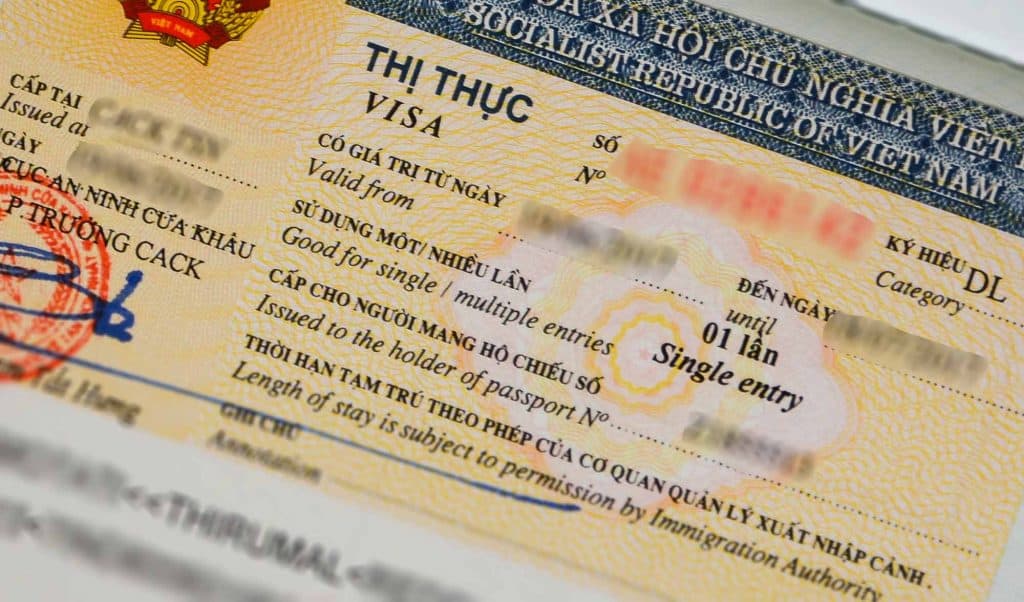
Vietnam has streamlined its visa process in recent years. As of now, Vietnam visa requirements are quite clear and easy to understand. Vietnam offers visa exemptions to quite a few nationalities. And those that require a visa can get an E-Visa or a visa from any nearest Vietnamese embassy.
Currently, there are 2 different visa options available to enter Vietnam as a tourist.
- Visa exemption: 25 countries are visa EXEMPT for stays from 14 days to 45 days
- E-Visa: All nationalities can obtain eVisa for stays up to 90 days
NOTE Vietnam 1-month or 3-month Visa on Arrival (VOA) for tourists is still suspended. It’s unclear whether Vietnam will instate its tourist VOA or instead add more countries to its E-Visa list.
Table of Contents
Vietnam visa requirements by nationality.
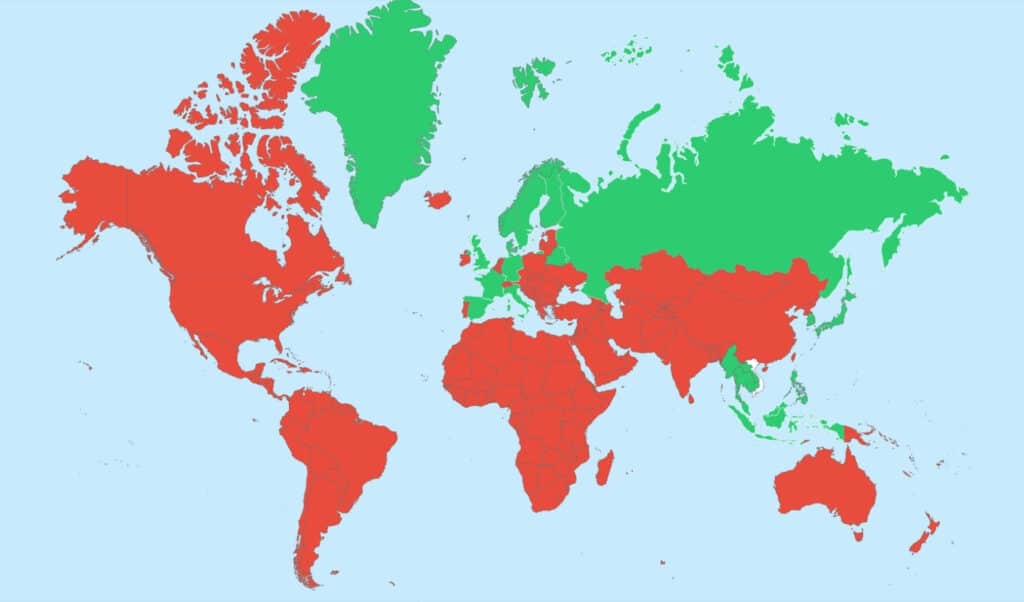
Minimum passport validity required to enter Vietnam as a tourist
Passport must be valid for at least one month beyond the visa expiration date.
VISA EXEMPT nationalities
90-day entry, 45-day entry.
- South Korea
- United Kingdom
30-day entry
21-day entry.
- Philippines
14-day entry
E-visa eligible nationalities.
- All nationalities are eligible for E-Visa
NOTE All nationalities are visa EXEMPT for visiting Phú Quốc island which is considered as a special economic zone. Must arrive and depart from the island directly and cannot transit through the mainland.

VIETNAM VISA-EXEMPTION
Nationals from 25 countries do not require any visa to enter Vietnam as a tourist. Some of these countries are from Southeast Asia and Europe.
Entry permission
Visa-exempt nationalities can stay from 14 days to 90 days in Vietnam depending on their nationality.
Documents to carry
Apart from your passport, you must also carry the below documents in print or on your smartphone.
- Proof of return or onward travel (your return or onward flight/bus/train ticket)
- Proof of accommodation (a hotel reservation for the first few days)
If you are traveling on a one-way ticket, make sure to get proof of onward ticket .
VIETNAM eVISA
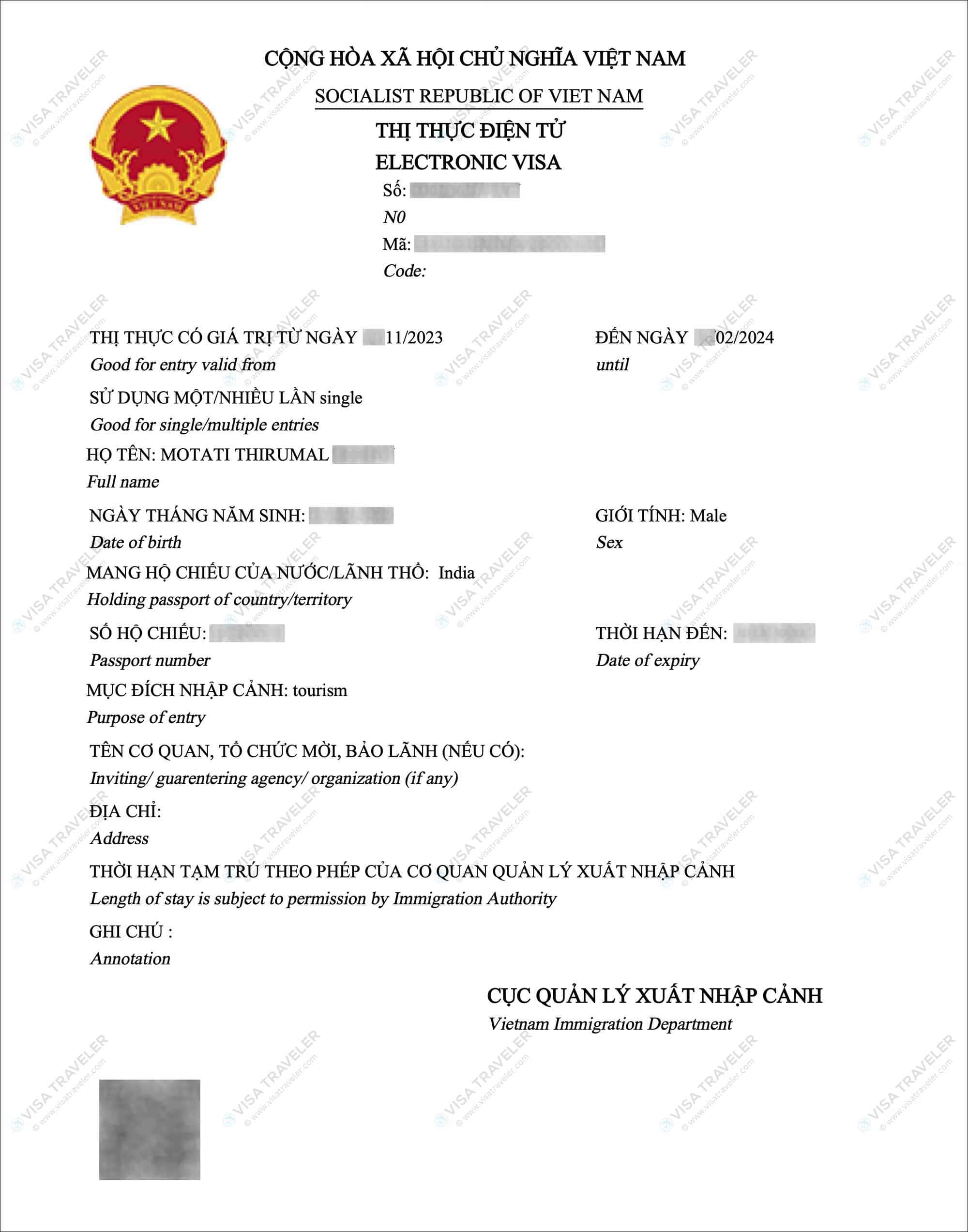
As of now, Vietnam eVisa is the only visa option available for tourists and visitors. All nationalities are eligible to apply for Vietnam eVisa.
Validity of Vietnam eVisa
The validity of Vietnam eVisa is maximum 90 days from the day of issue. You must enter and exit Vietnam within the validity of the E-Visa.
When to apply for eVisa
You can apply for your Vietnam eVisa as early as you like. The eVisa processing takes 3 working days, so you must apply at least 3 working days prior to your trip. In certain instances, it can take longer. I highly recommend applying at least two weeks prior to your trip.
How long can you stay in Vietnam on eVisa
With an E-Visa, you can stay up to 90 days or until the expiry of your eVisa, whichever is shorter. The immigration officer will write the date by which you must exit the country on the entry stamp in your passport. Usually, this exit date on your passport will match the expiration date of your eVisa.
eVisa application process
You can apply for the eVisa on the official Vietnam E-Visa Portal . You would need a scan of your passport data/ID page, a digital photo and a credit/debit card.
You can follow my step-by-step guide on applying for Vietnam eVisa . Follow along the steps outlined in the guide. It only takes 10 minutes to complete the application.
Documents required
You will need the following documents.
- Original passport
- A digital portrait photo
- A scan of your passport data/ID page
Photo requirements
The digital photograph must meet the following specifications.
- Photo must show the entire face
- Photo must be straight-looking without glasses
- Photo must be about 4 x 6 cm in dimensions
- Photo must be in JPG format only
The visa fee is $25 USD for single-entry and $50 USD for multiple-entry e-Visa. You would need a credit or debit card to pay the visa fee.
Processing time
The eVisa processing time is 3 working days, not including the day of application. If it’s taking longer than 3 working days, contact the e-Visa support.
Application tracking
You can track your application status from the Vietnam E-Visa portal application status page using your registration code, email and date of birth.
Your application can have any of the 2 statuses.
- In Processing: This status means that your application is still in process.
- Granted Visa: This status means your application is approved and ready for download
Customer service
In case of questions about your visa or visa status, you can contact the Vietnam Immigration Department at their support page, email or phone number.
WEB: E-Visa support page EMAIL: [email protected] PHONE: +84 243 825 7941
ENTRY AND EXIT PROCEDURE AT THE AIRPORT
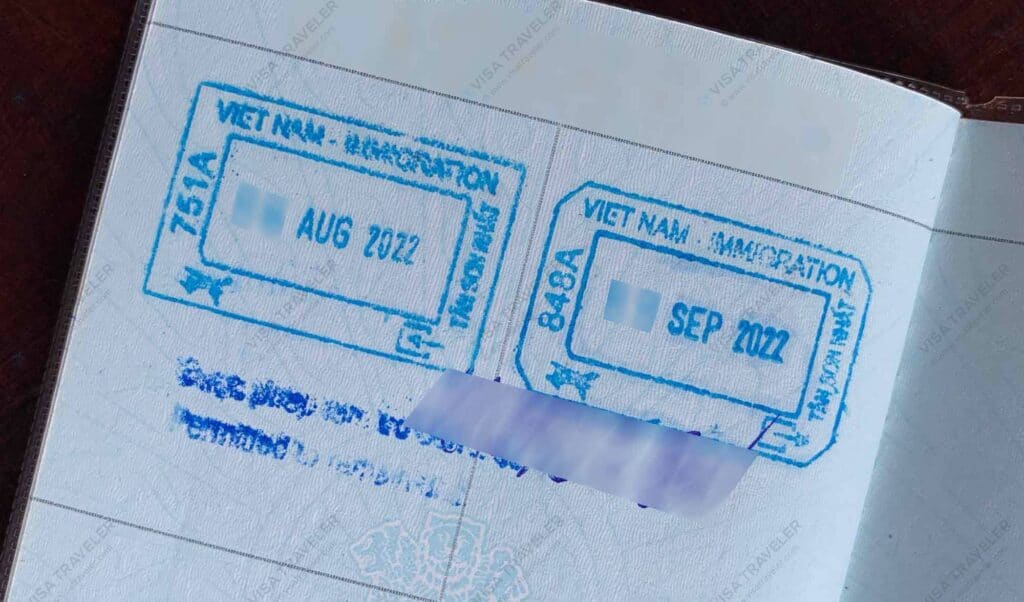
Entering Vietnam by air
After you get off your flight, walk towards immigration/passport control. If you are a visa-exempt national, present your passport and boarding pass. If you hold an eVisa, present your passport, boarding pass and a print or soft copy of your Vietnam eVisa to the immigration officer.
The immigration officer may ask a few questions such as how long you plan to stay, what you would like to do in Vietnam, etc.
The immigration office may also ask to see your return ticket. If you are flying on a one-way ticket, make sure to carry proof of an onward flight ticket to avoid any trouble at immigration.
Leaving Vietnam by air
Vietnam employs manned passport control. You will go through passport control on your exit. Present your passport and boarding pass. The immigration will not ask any questions unless you have overstayed your visa.
Vietnam has streamlined its visa process in recent years. About 25 nationalities from Southeast Asia and Europe do not require a visa to enter Vietnam. Nationals of all countries and territories are eligible to apply for eVisa.
Vietnam Visa on Arrival (VOA) is still suspended. There is no news on when VOA will be available again.
RELATED ARTICLES
- Thailand Visa for Tourists and Visitors
- Cambodia Visa for Tourists and Visitors
- Malaysia Visa for Tourists and Visitors
- Philippines Visa for Tourists and Visitors
WRITTEN BY THIRUMAL MOTATI

Thirumal Motati is an expert in tourist visa matters. He has been traveling the world on tourist visas for more than a decade. With his expertise, he has obtained several tourist visas, including the most strenuous ones such as the US, UK, Canada, and Schengen, some of which were granted multiple times. He has also set foot inside US consulates on numerous occasions. Mr. Motati has uncovered the secrets to successful visa applications. His guidance has enabled countless individuals to obtain their visas and fulfill their travel dreams. His statements have been mentioned in publications like Yahoo, BBC, The Hindu, and Travel Zoo.
PLAN YOUR TRAVEL WITH VISA TRAVELER
I highly recommend using these websites to plan your trip. I use these websites myself to apply for my visas, book my flights and hotels and purchase my travel insurance.
01. Apply for your visa
Get a verifiable flight itinerary for your visa application from DummyTicket247 . DummyTicket247 is a flight search engine to search and book flight itineraries for visas instantly. These flight itineraries are guaranteed to be valid for 2 weeks and work for all visa applications.
02. Book your fight
Find the cheapest flight tickets using Skyscanner . Skyscanner includes all budget airlines and you are guaranteed to find the cheapest flight to your destination.
03. Book your hotel
Book your hotel from Booking.com . Booking.com has pretty much every hotel, hostel and guesthouse from every destination.
04. Get your onward ticket
If traveling on a one-way ticket, use BestOnwardTicket to get proof of onward ticket for just $12, valid for 48 hours.
05. Purchase your insurance
Purchase travel medical insurance for your trip from HeyMondo . HeyMondo offers a 5% discount to Visa Traveler readers (use the link above), and covers all medical and travel emergencies during your trip.
Need more? Check out my travel resources page for the best websites to plan your trip.
LEGAL DISCLAIMER We are not affiliated with immigration, embassies or governments of any country. The content in this article is for educational and general informational purposes only, and shall not be understood or construed as, visa, immigration or legal advice. Your use of information provided in this article is solely at your own risk and you expressly agree not to rely upon any information contained in this article as a substitute for professional visa or immigration advice. Under no circumstance shall be held liable or responsible for any errors or omissions in this article or for any damage you may suffer in respect to any actions taken or not taken based on any or all of the information in this article. Please refer to our full disclaimer for further information.
AFFILIATE DISCLOSURE This post may contain affiliate links, which means we may receive a commission, at no extra cost to you, if you make a purchase through a link. Please refer to our full disclosure for further information.
MORE VISA GUIDES
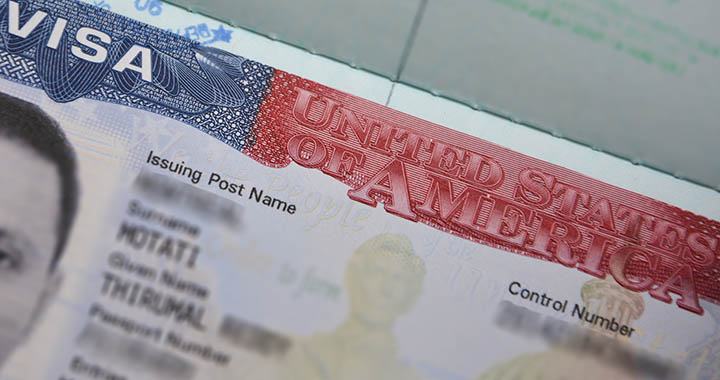
UNITED STATES

UNITED KINGDOM

VIEW ALL VISA GUIDES
- Cookie Policy
- Copyright Notice
- Privacy Policy
- Terms of Use
- Flight Itinerary
- Hotel Reservation
- Travel Insurance
- Onward Ticket
- Testimonials
Search this site
You are using an outdated browser. Please upgrade your browser to improve your experience.
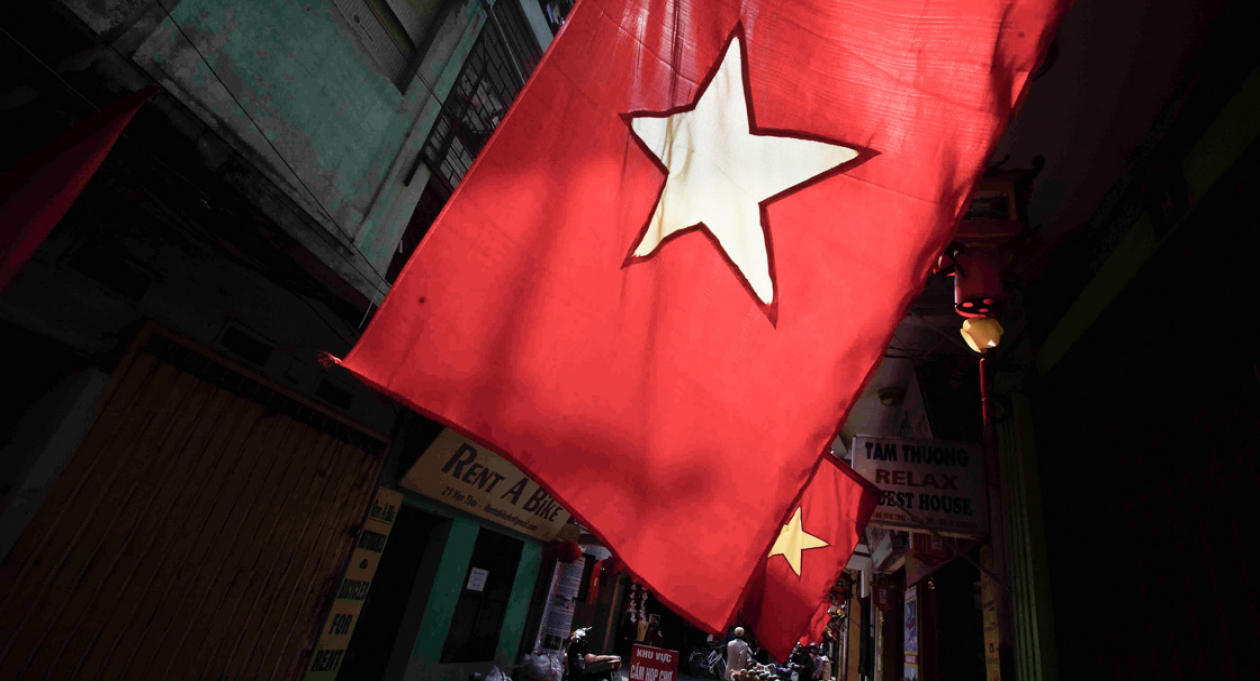
An official guide to e-Visas for Vietnam
From 15th august 2023, citizens of all countries and territories around the world can apply for electronic visas (e-visas) entering vietnam and enjoy the 90-day e-visa duration, valid for multiple entry..
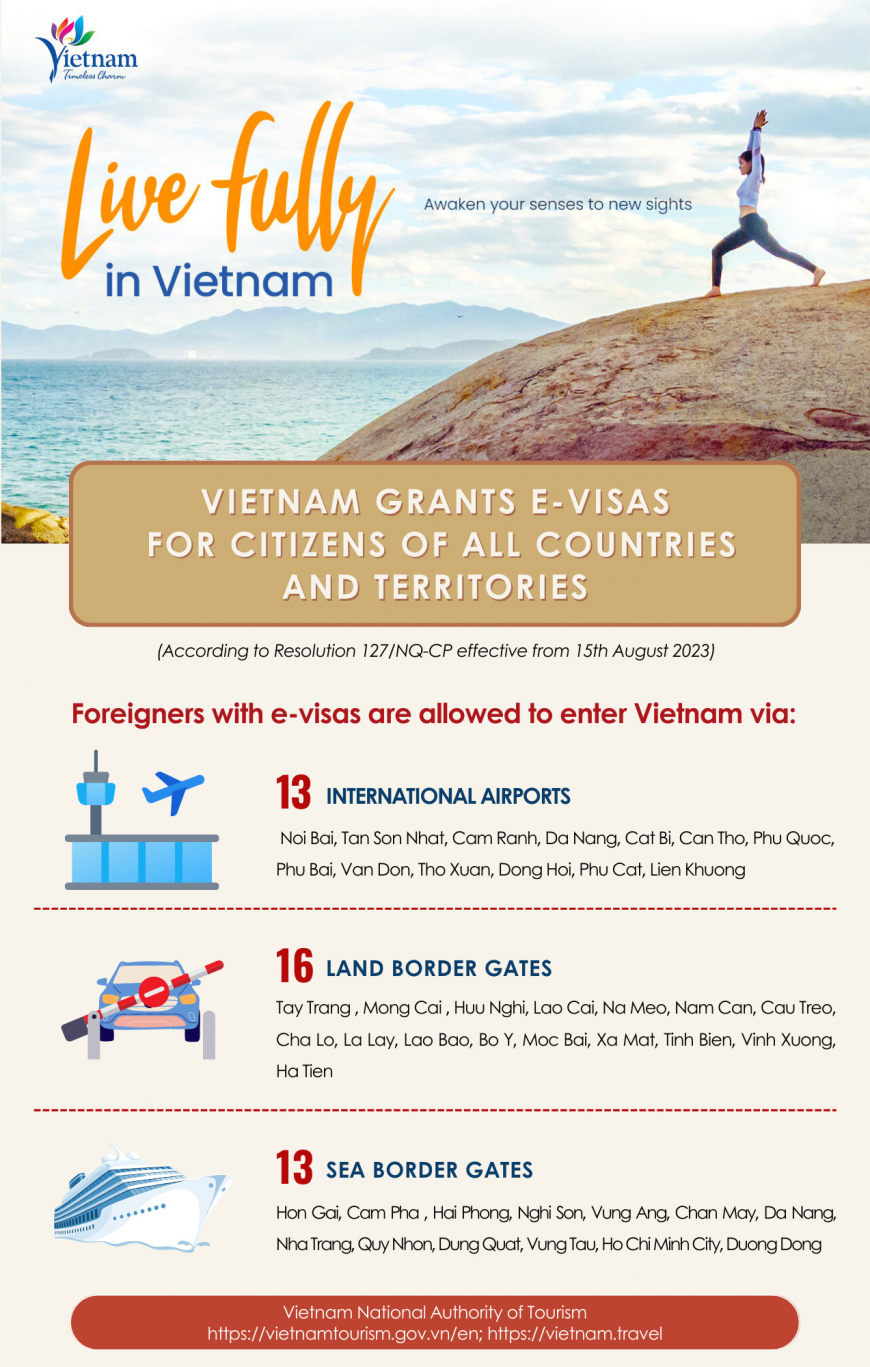
Foreigners with e-visas are allowed to enter Vietnam via:
13 international airports: Noi Bai (Ha Noi), Tan Son Nhat (Ho Chi Minh City), Cam Ranh (Khanh Hoa), Da Nang, Cat Bi (Hai Phong), Can Tho, Phu Quoc (Kien Giang), Phu Bai (Thua Thien Hue), Van Don (Quang Ninh), Tho Xuan (Thanh Hoa), Dong Hoi (Quang Binh), Phu Cat (Binh Dinh), Lien Khuong (Lam Dong).
16 land border gates: Tay Trang (Dien Bien), Mong Cai (Quang Ninh), Huu Nghi (Lang Son), Lao Cai, Na Meo (Thanh Hoa), Nam Can (Nghe An), Cau Treo (Ha Tinh), Cha Lo (Quang Binh), La Lay and Lao Bao (Quang Tri), Bo Y (Kon Tum), Moc Bai and Xa Mat (Tay Ninh), Tinh Bien and Vinh Xuong (An Giang), Ha Tien (Kien Giang).
13 sea border gates: Hon Gai and Cam Pha (Quang Ninh), Hai Phong, Nghi Son (Thanh Hoa), Vung Ang (Ha Tinh), Chan May (Thua Thien Hue), Da Nang, Nha Trang (Khanh Hoa), Quy Nhon (Binh Dinh), Dung Quat (Quang Ngai), Vung Tau (Ba Ria - Vung Tau), Ho Chi Minh City, Duong Dong (Kien Giang).
What is Vietnam’s e-visa?
Vietnam's e-visa is one of several visa types offered by the Vietnam Immigration Department to foreigners entering the country. The e-visa is valid for 90 days, and multiple entry. As of 15th August 2023, Vietnam's e-visa is available to all countries/territories around the world.
Travellers can apply directly for e-visas at Vietnam e-Visa Official Website
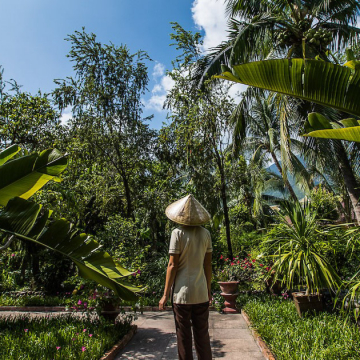
- You are here:
- Things to do
- An official guide to e-Visas in Vietnam
Create an account
Already have an account? Click here to sign in
By clicking submit, you agree to our Privacy Policy and Terms of Use
Sign in with your social accounts
Sign in with your email
Forgot password? Click here to get it back
Don't have an account? Sign up here
Forgot Password
The entered email has subscribed for Vietnam Tourism monthly newsletter

